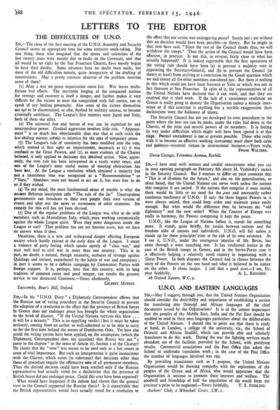Sm,—I have read with interest and cordial concurrence what you
say in your opening paragraph on February 8th about M. Vyshinsky's tactics in the Security Council. But I venture to differ on your comment that "This is of ill-omen for the future," and also on the generalisation, so often heard, that the United Nations can never work unless the nations th'at comprise it are united. If the nations that comprise it were united, there would be little or no need for the ..vast and necessarily rather cumbrous machinery of U.N.O.‘ If only the three biggest Powers in it were always united, they could keep order and maintain peace easily enough. But what would the difference then be between the "old diplomacy" and the new order? When the Concert of Europe was really in harmony, the Powers composing it kept the peace.
U.N.O., like the League of Nations before it, stands for something more. It stands, quite briefly, for justice between nations and the freedom alike of nations and individuals. U.N.O. will fail unless it stands up for these principles' even at the risk of its own existence. As I see it, U.N.O., under the courageous impulse of Mr. Bevin, has come through a most searching test. It has vindicated justice in the case of the British troops in Greece, and in the Soviet-Persia case it is effectively helping a relatively small country in negotiating with a Great Power. In both disputes the Council had to choose between the unity of the Powers on the one hand and what it believed to be justice on the other. It chose justice. I call that a good start.—I am, Sir,


























 Previous page
Previous page